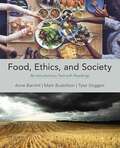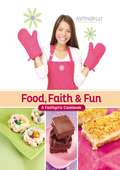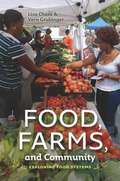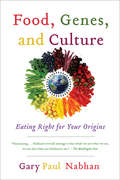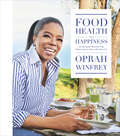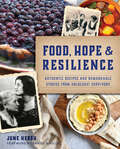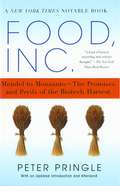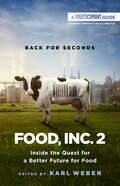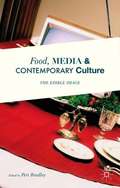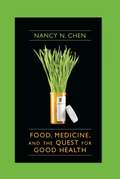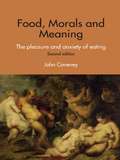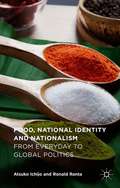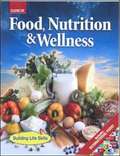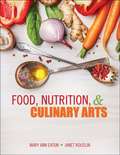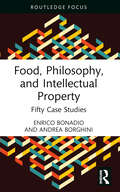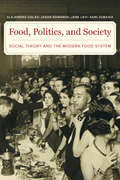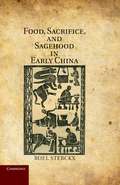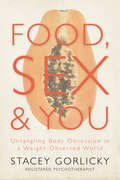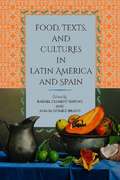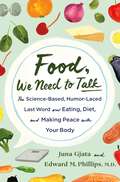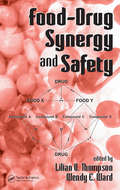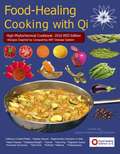- Table View
- List View
Food, Ethics, and Society: An Introductory Text with Readings
by Anne Barnhill Tyler Doggett Mark BudolfsonFood, Ethics, and Society: An Introductory Text with Readings presents seventy three readings that address real world ethical issues at the forefront of the food ethics debate. Topics covered include hunger, food justice, consumer ethics, food and identity, food and religion, raising plants and animals, food workers, overconsumption, obesity, and paternalism. The selections are enhanced by chapter and reading introductions, study questions, and suggestions for further reading. Ideal for both introductory and interdisciplinary courses, Food, Ethics, and Society explains basic philosophical concepts for new students and forges new ground on several ethical debates.
Food, Faith and Fun: A Faithgirlz! Cookbook
by ZondervanStir Up Some Food, Fun & Faith in the KitchenGrab your apron and a friend or two and cook up some tasty treats and yummy eats. With step-by-step instructions and photos good enough to make your mouth water, this cookbook helps you master simple recipes, impressive main courses, and elegant deserts, including:Homemade Hot PretzelsToffee TartsWhite Chicken ChiliMango Chicken QuesadillasBest Friend CupcakesSoups, smoothies, holiday recipes, and much more—some contributed from other Faithgirlz just like you. Plus, you’ll also experience cooking as a memory-making, God-honoring, wonderful way to share and serve delicious food with those you love.So whether you eat or drink or whatever you do, do it all for the glory of God.—1 Corinthians 10:31
Food, Farms, and Community: Exploring Food Systems
by Lisa Chase Vern GrubingerThroughout the United States, people are increasingly concerned about where their food comes from, how it is produced, and how its production affects individuals and their communities. The answers to these questions reveal a complex web of interactions. While large, distant farms and multinational companies dominate at national and global levels, innovative programs including farmers' markets, farm-to-school initiatives, and agritourism are forging stronger connections between people and food at local and regional levels. At all levels of the food system, energy use, climate change, food safety, and the maintenance of farmland for the future are critical considerations. The need to understand food systems--what they are, who's involved, and how they work (or don't)--has never been greater. Food, Farms, and Community: Exploring Food Systems takes an in-depth look at critical issues, successful programs, and challenges for improving food systems spanning a few miles to a few thousand miles. Case studies that delve into the values that drive farmers, food advocates, and food entrepreneurs are interwoven with analysis supported by the latest research. Examples of entrepreneurial farms and organizations working together to build sustainable food systems are relevant to the entire country--and reveal results that are about much more than fresh food.
Food, Genes, and Culture: Eating Right for Your Origin
by Gary Paul NabhanVegan, low fat, low carb, slow carb: Every diet seems to promise a one-size-fits-all solution to health. But they ignore the diversity of human genes and how they interact with what we eat. In Food, Genes, and Culture, renowned ethnobotanist Gary Nabhan shows why the perfect diet for one person could be disastrous for another. If your ancestors were herders in Northern Europe, milk might well provide you with important nutrients, whereas if you're Native American, you have a higher likelihood of lactose intolerance. If your roots lie in the Greek islands, the acclaimed Mediterranean diet might save your heart; if not, all that olive oil could just give you stomach cramps. Nabhan traces food traditions around the world, from Bali to Mexico, uncovering the links between ancestry and individual responses to food. The implications go well beyond personal taste. Today's widespread mismatch between diet and genes is leading to serious health conditions, including a dramatic growth over the last 50 years in auto-immune and inflammatory diseases. Readers will not only learn why diabetes is running rampant among indigenous peoples and heart disease has risen among those of northern European descent, but may find the path to their own perfect diet.
Food, Health, and Happiness: 115 On-Point Recipes for Great Meals and a Better Life
by Oprah WinfreyOprah Winfrey will be the first to tell you, she has had a complicated relationship with food. It’s been both a source of delight and comfort for her, but also the cause of an ongoing struggle with her weight. In Food, Health, and Happiness, Oprah shares the recipes that have allowed eating to finally be joyful for her. With dishes created and prepared alongside her favorite chefs, paired with personal essays and memories from Oprah herself, this cookbook offers a candid, behind-the-scenes look into the life (and kitchen!) of one of the most influential and respected celebrities in the world. Delicious, healthy, and easy to prepare, these are the recipes Oprah most loves to make at home and share with friends and family. From simple pleasures like Unfried Chicken and Turkey Chili, to such celebrations of freshness as Tuscan Kale and Apple Salad and Pasta Primavera, this is food as it should be: a taste of happiness, a ritual to be shared, a toast to life.
Food, Hope & Resilience: Authentic Recipes and Remarkable Stories from Holocaust Survivors (American Palate)
by June HershCulinary Traditions Preserved, Stories Never to be Forgotten This vital collection of survivor stories uplifts and inspires alongside recipes that nourish your soul. Read about daring partisans who fought in the woods, hidden children who sought comfort from strangers and those who endured unimaginable internment. For Holocaust survivors, food was a way to connect their lives before the war with the homes they created after. Their kitchens were filled with the aromas of familiar foods like chicken soup and brisket while unfamiliar delights they adopted, like arroz con pollo and gnocchi, became part of their repertoire. These are the recipes they share with you. Culinary icons such as Michael Solomonov, Jonathan Waxman, Ina Garten and more contribute their own recipes as tribute to the remarkable survivor community. Author June Hersh gives readers a taste of history and a life-affirming message that honors the legacy of Holocaust survivors. A portion of the proceeds from sales of this book will benefit organizations committed to Holocaust education.
Food, Inc.
by Peter PringleFor most people, the global war over genetically modified foods is a distant and confusing one. The battles are conducted in the mystifying language of genetics. A handful of corporate "life science" giants, such as Monsanto, are pitted against a worldwide network of anticorporate ecowarriors like Greenpeace. And yet the possible benefits of biotech agriculture to our food supply are too vital to be left to either partisan. The companies claim to be leading a new agricultural revolution that will save the world with crops modified to survive frost, drought, pests, and plague. The greens warn that "playing God" with plant genes is dangerous. It could create new allergies, upset ecosystems, destroy biodiversity, and produce uncontrollable mutations. Worst of all, the antibiotech forces say, a single food conglomerate could end up telling us what to eat. In Food, Inc., acclaimed journalist Peter Pringle shows how both sides in this overheated conflict have made false promises, engaged in propaganda science, and indulged in fear-mongering. In this urgent dispatch, he suggests that a fertile partnership between consumers, corporations, scientists, and farmers could still allow the biotech harvest to reach its full potential in helping to overcome the problem of world hunger, providing nutritious food and keeping the environment healthy.
Food, Inc. 2: Inside the Quest for a Better Future for Food
by Participant and Karl WeberAn eye-opening guide to how America feeds itself and an essential companion book to the new documentary America&’s food system is broken, harming family farmers, workers, the environment, and our health. But it doesn&’t have to be this way. Here, brilliant innovators, scientists, journalists and activists explain how we can create a hopeful new future for food, if we have the courage to seize the moment. In 2008, the award-winning documentary Food, Inc. shook up our perceptions of what we ate. Now, the movie&’s timely sequel and this new companion book will address the remarkable developments in the world of food—from lab-grown meat to the burgeoning food sovereignty movement—that have unfolded since then. Featuring thought-provoking original essays from: Michael Pollan • Eric Schlosser • David E. Kelley and Andrew Zimmern • Senator Cory Booker • Sarah E. Lloyd • Carlos A. Monteiro and Geoffrey Cannon • Lisa Elaine Held • Larissa Zimberoff • Saru Jayaraman • Christiana Musk • Nancy Easton • Leah Penniman • David LeZaks and Lauren Manning • The Coalition of Immokalee Workers • Michiel Bakker • Danielle Nierenberg This book is the perfect roadmap to understanding not only our current dysfunctional food system, but also what each of us can do to help reform it.
Food, Labor, And Beverage Cost Control: A Concise Guide
by Edward E. SandersFood, Labor, and Beverage Cost Control: A Concise Guide
Food, Media and Contemporary Culture: The Edible Image
by Peri BradleyFood, Media and Contemporary Culture is designed to interrogate the cultural fascination with food as the focus of a growing number of visual texts that reveal the deep, psychological relationship that each of us has with rituals of preparing, presenting and consuming food and images of food.
Food, Medicine, and the Quest for Good Health
by Chen Nancy N.Drawing on medical texts and food therapy practices from around the world and throughout history, Nancy N. Chen locates old and new crossovers between food and medicine in different social and cultural contexts.
Food, Medicine, and the Quest for Good Health: Nutrition, Medicine, and Culture
by Nancy ChenWhat we eat, how we eat, where we eat, and when we eat are deeply embedded cultural practices. Eating is also related to how we medicate. The multimillion-dollar diet industry offers advice on how to eat for a better body and longer life, and avoiding harmful foods (or choosing healthy ones) is considered separate from consuming medicine-another multimillion-dollar industry. In contrast, most traditional medical systems view food as inseparable from medicine and regard medicinal foods as the front line of healing. Drawing on medical texts and food therapy practices from around the world and throughout history, Nancy N. Chen locates old and new crossovers between food and medicine in different social and cultural contexts. The consumption of spices, sugar, and salt was once linked to specific healing properties, and trade in these commodities transformed not just the political economy of Europe, Asia, and the New World but local tastes and food practices as well. Today's technologies are rapidly changing traditional attitudes toward food, enabling the cultivation of new admixtures, such as nutraceuticals and genetically modified food, that link food to medicine in novel ways. Chen considers these developments against the evolving food regimes of the diet industry in order to build a framework for understanding diet as individual practice, social prescription, and political formation.
Food, Morals and Meaning: The Pleasure and Anxiety of Eating
by John CoveneyFollowing on from the success of the first edition, John Coveney traces our complex relationship with food and eating and our preoccupation with diet, self-discipline and food guilt. Using our current fascination with health and nutrition, he explores why our appetite for food pleasures makes us feel anxious. This up-to-date edition includes an examination of how our current obsession with body size, especially fatness, drives a national and international panic about the obesity ‘epidemic’. Focusing on how our food anxieties have stemmed from social, political and religious problems in Western history, Food, Morals and Meaning looks at: the ancient Greeks’ preoccupation with eating early Christianity and the conflict between the pleasures of the flesh and spirituality scientific developments in eighteenth and nineteenth century Europe and our current knowledge of food the social organization of food in the modern home, based on real interviews the obesity ‘epidemic’ and its association with moral degeneration. Based on the work of Michel Foucault, this fresh and updated edition explains how a rationalization food choice – so apparent in current programmes on nutrition and health – can be traced through a genealogy of historical social imperatives and moral panics. Food, Morals and Meaning is essential reading for those studying nutrition, public health, sociology of health and illness and sociology of the body.
Food, National Identity and Nationalism: From Everyday to Global Politics
by Atsuko Ichijo Ronald RantaExploring a much neglected area, the relationship between food and nationalism, this book examines a number of case studies at various levels of political analysis to show how useful the food and nationalism axis can be in the study of politics.
Food, Nutrition & Wellness
by Roberta Larson DuyffMotivate your students to develop healthy eating and fitness habits withGlencoeFood, Nutrition, & Wellness! Authored by a prominent member of theAmerican Dietetic Association Based on the latest in nutrition science and research Writtten in accessible style with many activities to provide applications, practice, and involvement Offers recipes for both All-American favorites and International dishes Focuses on nutrition basics, food prep, and kitchen basics (including a strong focus on safety and sanitation) Illustrates food prep process step-by-step inhow-to features Supports project-based learning with unit-long, hands-on applications Provides point-of-use academic integration (math, science, and English language arts) to help teachers meet Perkins mandates
Food, Nutrition and Culinary Arts
by Mary Anne Eaton Janet RouslinNutrition textbook for undergraduates
Food, Philosophy, and Intellectual Property: Fifty Case Studies
by Andrea Borghini Enrico BonadioThis is a book about food, philosophy, and intellectual property rights.Taken separately, these are three well-known subjects, but it is uncommon to consider them together. The book comprises 50 case studies, organized around eight themes: images; genericity and descriptiveness; language traps; procedures; menus, recipes, and creativity; boundaries; biotech; and empowerment. The introductory chapter frames the selection of cases and encourages readers to look beyond them, envisaging new lenses to look at food vis-à-vis intellectual property. The terrain encompassed is wide-ranging and reaches out to fine-grained aspects of food products, recipes, and cooking. Conceived for a wide scope of readers, the volume ultimately interrogates the links between food and cultural identity, bringing to the fore the ethical, political, and aesthetic worth of culinary arts and gastronomic experiences.This accessible book will be of value to scholars, students, practitioners, and others with interests in the areas of intellectual property, food law, and food studies.
Food, Politics, and Society: Social Theory and the Modern Food System
by Alejandro ColasFood and drink has been a focal point of modern social theory since the inception of agrarian capitalism and the industrial revolution. From Adam Smith to Mary Douglas, major thinkers have used key concepts such as identity, exchange, culture, and class to explain the modern food system. Food, Politics, and Society offers a historical and sociological survey of how these various ideas and the practices that accompany them have shaped our understanding and organization of the production, processing, preparation, serving, and consumption of food and drink in modern societies. Divided into twelve chapters and drawing on a wide range of historical and empirical illustrations, this book provides a concise, informed, and accessible survey of the interaction between social theory and food and drink. It is perfect for courses in a wide range of disciplines.
Food, Sacrifice, and Sagehood in Early China
by Roel SterckxIn ancient China, the preparation of food and the offering up of food as a religious sacrifice were intimately connected with models of sagehood and ideas of self-cultivation and morality. Drawing on received and newly excavated written sources, Roel Sterckx's book explores how this vibrant culture influenced the ways in which the early Chinese explained the workings of the human senses, and the role of sensory experience in communicating with the spirit world. The book, which begins with a survey of dietary culture from the Zhou to the Han, offers intriguing insights into the ritual preparation of food - some butchers and cooks were highly regarded and would rise to positions of influence as a result of their culinary skills - and the sacrificial ceremony itself. As a major contribution to the study of early China and to the development of philosophical thought, the book will be essential reading for students of the period, and for anyone interested in ritual and religion in the ancient world.
Food, Sex, and You: Untangling Body Obsession in a Weight-Obsessed World
by Stacey GorlickyA look at our relationship with food and sex, what happens when we become too dependent on either, and how to start recovering. The need for food and the desire for sex are powerful forces, so powerful they can turn our bodies into battle grounds. Bingeing, exercising to exhaustion, even entering repeatedly into unhealthy relationships — these are all addictive behaviours and symptoms of our body-obsessed world. In Food, Sex & You, psychotherapist and recovered food addict Stacey Gorlicky will set you on a course to achieving full body acceptance and help you leave body obsession behind. By sharing her personal journey and the stories of her clients, Stacey demonstrates how your attitude toward your body and your relationship with food and sex have been shaped by your upbringing, past traumatic experiences, and societal pressures. She then provides an action plan that will help you to sort out your feelings and behaviours surrounding food, allowing you to gain control of your eating. Feel good about food. Feel great about sex. Embrace the new you.
Food, Texts, and Cultures in Latin America and Spain
by Rafael Climent-Espino Ana M. Gómez-BravoThe fourteen essays in Food, Texts, and Cultures in Latin America and Spain showcase the eye-opening potential of a food lens within colonial studies, ethnic and racial studies, gender and sexuality studies, and studies of power dynamics, nationalisms and nation building, theories of embodiment, and identity. In short, Food, Texts, and Cultures in Latin America and Spain grapples with an emerging field in need of a foundational text, and does so from multiple angles. The studies span from the Middle Ages to the twenty-first century, and the contributing scholars occupy diverse fields within Latin American and Hispanic Studies. As such, their essays showcase eclectic critical and theoretical approaches to the subject of Latin American and Iberian food.Food, Texts, and Cultures in Latin America and Spain also introduces the first English-language publication of works from such award-winning scholars as Adolfo Castañón of the Mexican Academy of Language; Sergio Ramírez, winner of the 2017 Miguel de Cervantes Prize in Literature; and Carmen Simón Palmer, winner of the 2015 Julián Marías Prize for Research.
Food, Texts, and Cultures in Latin America and Spain
by Rafael Climent-Espino and Ana M. Gómez-BravoA foundational text in the emerging field of Latin American and Iberian food studies
Food, We Need to Talk: The Science-Based, Humor-Laced Last Word on Eating, Diet, and Making Peace with Your Body
by Juna Gjata Edward M. M.D.This is an unusual – and unusually interesting – exploration of diet, weight and health that touches on memoir but lands on practicality. It’s a cut-to-the-chase book that makes you realize that not everything you know about dieting and weight loss – no matter how much you've read or experienced before – is true, and that way too much of your brain, your time and your pocketbook has been taken up with the endless (and futile) quest. The authors’ two distinct voices thread and play off each other throughout the book as they cover these intensively-researched topics:–Metabolism–Why Every Diet Works... and Then Doesn’t–What Actually is “Healthy” Food?–The (Almost) Magic Pill: Exercise–Detox Teas, Juice Cleanses, Supplements, & Waist Trainers–The Science of Fat Loss–Sleep, Stress and Your Waistline–Disordered Eating or Eating Disorder?–The History of Dieting–The Biggest Key to Success - A Manifesto on Body Image–How to Make This Your Last Diet–Becoming a Professional BS DetectorFood, We Need To Talk is a young woman’s look at the landscape of dieting, weight and health as it is right this moment–from the modern body-inclusivity movement to weight and dressing for social media instead of real life–as well as a very relatable doctor’s long view. Together, they’ve created a unique, information-rich book with a real voice that entertains as it pulls you through.
Food-Drug Synergy and Safety
by Lilian U. Thompson Wendy E. WardScientists, health professionals, and consumers are increasingly interested in the relationships between food components and food-drug combinations as they strive to find more effective ways to prevent or treat chronic disease. As one of the first unified and in-depth sources in this emerging topic, Food-Drug Synergy and Safety explores the vast po
